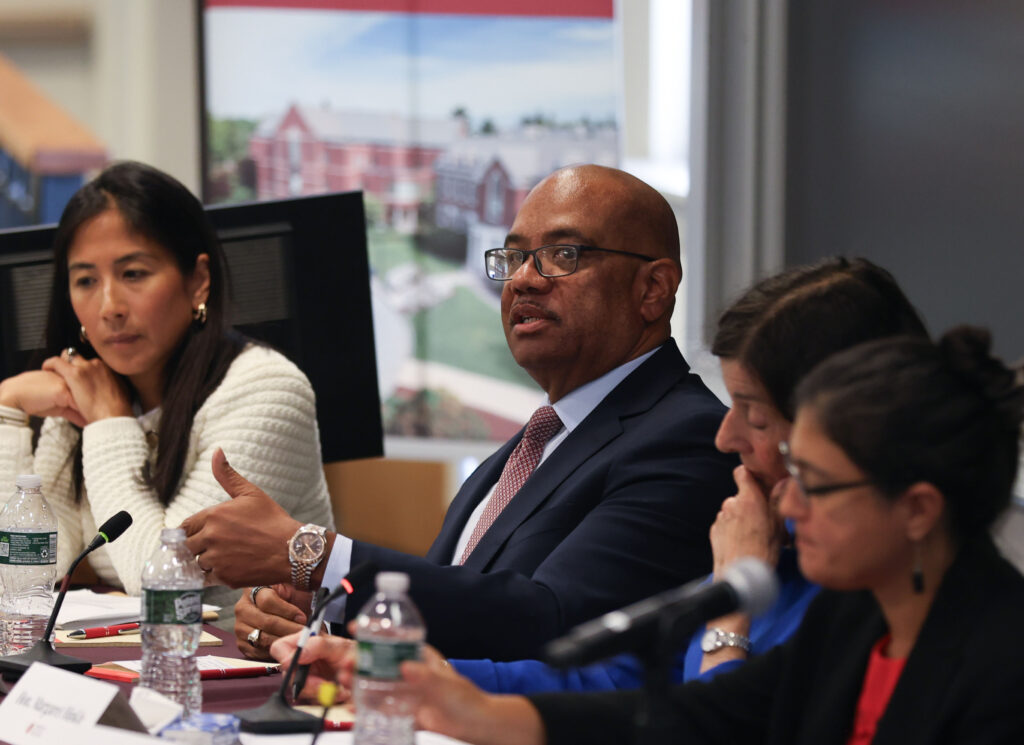Celebrating ten years of shaping and examining critical public policy issues, the Rappaport Center kicked off its 2025 fall programming with a panel of legal experts who explored the question, “How do state and localities respond to the new federal law enforcement agenda?” Michelle Leung, clinical instructor at Harvard Law School, moderated the timely conversation, which drew a capacity crowd.
Their conversation covered how the federal government historically used its resources to investigate patterns and practices of unconstitutional conduct by law enforcement agencies as opposed to individual incidents or police officers. Although these investigations pull from the vast resources of the Department of Justice (DOJ) and result in powerful, federally binding court settlements called “consent decrees,” the investigations are both time and labor intensive. Over 17,000 agencies exist nationwide; the DOJ has only launched formal investigations against 71.
This is not as surprising as it sounds. As Ronald Davis, former director of the United States Marshals Service, explained, “Local governments have the oversight and responsibility for public safety. I think the key for communities is not to over-rely on the federal government.”
Instead, Davis suggests that local governments should build their capacity so that it doesn’t matter what is happening in Washington, DC. As administrations come and go, states and localities can deploy a variety of different tools.
These tools are more critical now. In April 2025, in an executive order entitled “Strengthening and Unleashing America’s Law Enforcement,” the Trump Administration declared that it would conclude all pattern and practice investigations. The DOJ’s withdrawal from police accountability work provides an opportunity for others, particularly at a state and local level, to take a more active role.
“We’re helping and the way we help is by suing people,” Matthew Segal, co-director of the ACLU’s State Supreme Court Initiative, said, garnering a laugh from the audience. For Segal, representing actual human beings is an honor and a privilege: “Don’t ignore clients. When you represent a client, you are grounded in ethics.” Davis later affirmed this point by stating that individual lawsuits are a way to spur police departments to enact real change. “You can argue, you can yell, you can diversify, but sometimes what you need is a good old-fashioned lawsuit.”
Segal pointed to another source of accountability: prosecutors. He explained that an available and underused tool is the set of obligations that fall on prosecutors when members of the prosecution team commit misconduct. “The job of prosecution is to disclose all of the misconduct,” Segal said, referencing Brady v. Maryland, which requires prosecutors to turn over exculpatory evidence, as well as the landmark Massachusetts Supreme Judicial Court cases involving misconduct by chemists at the state drug lab and by Springfield police officers. The tools are already in place, Segal argued. It’s just a matter of enforcing them.
While litigation is an often-used strategy to ensure police accountability, the panelists emphasized that it is not the only strategy. Davis, who once headed the DOJ’s Office of Community Oriented Policing Services (COPS), shared that it was important to provide support for local law enforcement agencies who want to improve. He also added, “We have to work on our industry. There is no coherent national body of standards.” Unlike many other professions that have a disciplinary board to help regulate misconduct, law enforcement often does not.
This is why the Massachusetts Peace Officer Standards and Training (POST) Commission, an organization established as part of the criminal justice reform legislation of 2020, plays an important role. The Hon. Margaret Hinkle ’77, who is chair of the commission and a retired Superior Court Judge, explained that the commission’s mission is to improve policing and enhance public confidence in law enforcement. It does so by implementing a fair process for mandatory certification, discipline, and training for all peace officers in the Commonwealth.
The POST Commission also complements the work of the Massachusetts Attorney General’s office, which launched its Police Accountability Unit in 2023. The office sorts through complaint intakes every week, referring some to the POST commission, conducting investigations that lead to litigation, or writing reports that expose patterns and practice of misconduct.
It’s still not enough, however, according to Lizz Matos, chief of the Massachusetts Attorney General’s Civil Rights Division. “We can’t be relying on complaints people file,” she said. “We need to be on the ground, need to be in touch with folks because the only way we’re going to get systemic change and reform is with communities driving the work and helping to shape what the remedies are that they want to see.” As Leung summarized, “when you have the community’s trust, you can carry out the law enforcement’s mission more effectively.”
Photograph by Reba Saldanha


